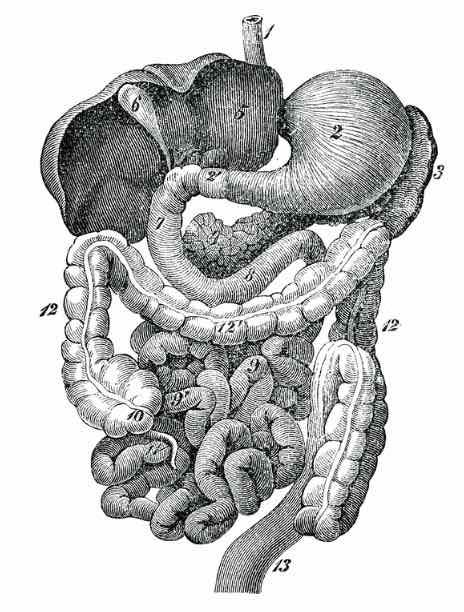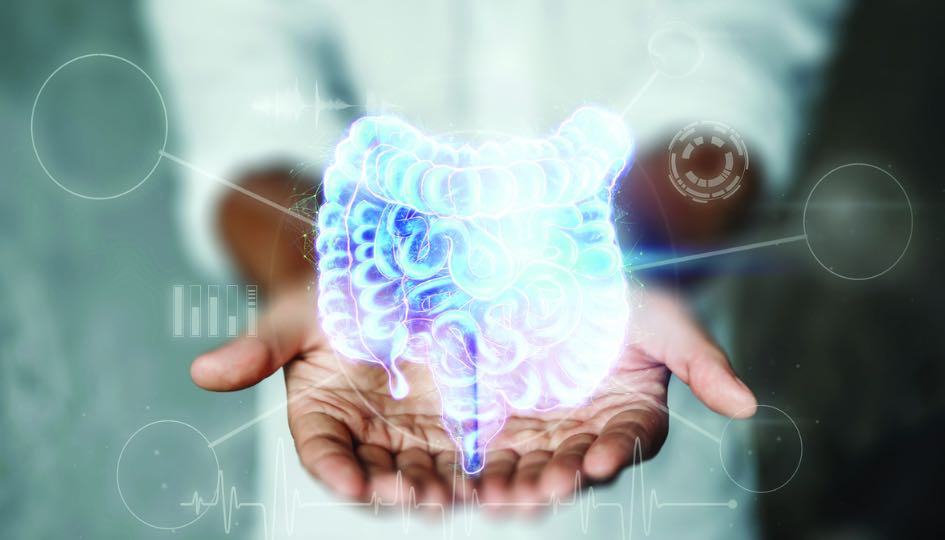Healthy from the inside out
In OTC
Follow this topic
Bookmark
Record learning outcomes
The gut microbiome helps us to digest dietary fibre, aids absorption of vitamins and is essential for our immune function. Sometimes called our ‘second brain’, the gut is home to over 100 trillion microbes which make up the gut microbiome. Composed of more than 1,000 varieties of bacteria, fungi, yeasts, viruses, protozoa and archea, these micro-organisms are essential for normal gut function and homeostasis, as well as for supporting our general health.
The gut microbiome has attracted a huge amount of research over the past decade. “It is now known that the gut microbiome is a key influence on the health and function of the gut, on the host’s immune system, and on the gut-brain axis. This research has also shown there is great variation in the gut microbiome of individuals,” says Dr Linda Thomas, spokesperson for Guts UK and secretary of the British Gastroenterology Gut Microbiota for Health expert panel.
"Although there is no definition of what constitutes a healthy gut microbiome, many health conditions have been linked to an altered one"
“There is a growing body of research that shows our gut bacteria can affect many aspects of our health and wellbeing and that gut dysbiosis can play a role in conditions such as irritable bowel syndrome (IBS) and irritable bowel disease (IBD),” says Chloe Hall, registered dietician and British Dietetic Association spokesperson.
Cathy Crossthwaite, Numark OTC business development executive, believes pharmacy is well positioned to support customers with their gut health. “From guidance around prebiotics and probiotics to our core gastrointestinal offering, pharmacy has the knowledge to support customers and point them in the right direction,” she says.
The microbiome explained
Each of us has a unique microbiome, with around 160 different types of bacteria in two main families – Bacteriodetes and Firmicutes. The main function of the microbiome is to enable digestion; without it, the body is unable to break down dietary fibre and starch.
Gut bacteria ferment fibre and starch to produce fatty acids, which the gut uses as fuel. These acids are then converted into fats or sugars in the liver. Gut microbes also produce vitamins, including B and K. The molecules produced by gut bacteria also influence how well a person responds to medicines.
Gut bacteria are essential for development and renewal of the gut lining and are key to the development and balance of the immune system. “The link between the gut microbiome and the brain – the gut-brain axis – may also mean that mood can be affected,” says Dr Thomas. Links have also been made with Alzheimer’s and Parkinson’s disease.
Diet has a huge impact on the diversity of bacteria in the microbiome. The typical Western diet, high in carbohydrates, fat and sugar compared with an Eastern diet, which is typically higher in fibre, is much lower in microbe diversity. Having a large variety of micro-organism species in the gut is essential for a healthy body. “Although there is no definition of what constitutes a healthy gut microbiome, many health conditions have been linked to an altered one,” says Dr Thomas.
Factors linked to poorer health or increased disease risk include:
- Reduced diversity – a narrower spectrum of microbial species
- Lower numbers of beneficial microbes such as Bifidobacterium
- Loss of keystone species that perform important metabolic functions in the gut
- Reduced resilience to challenges such as medications (eg antibiotics), infection, poor diet, stress and ageing.
“A poor microbiome profile may impact the immune system, increasing susceptibility to common infections,” says Dr Thomas. “We know that loss of biodiversity can cause infection such as C. difficile in hospital patients after a strong dose of antibiotics, which wipe out large numbers of gut bacteria and allow it to spread easily.”
Inflammatory bowel conditions such as ulcerative colitis and Crohn’s result when the immune system attacks the gut lining. Research has found that people affected by these conditions have fewer varieties of bacteria in their gut. There have been similar findings for diseases beyond the gut, including diabetes, liver and heart disease, cancers and Alzheimer’s.
“IBS and constipation are common conditions that may be associated with adverse changes in the gut microbiome,” says Dr Thomas. “Increased susceptibility to common infections such as colds may also be linked to changes, as may anxiety, stress and poor mood.”
Latest scientific findings
“The most significant advances recently have been due to advances in genomic sequencing,” says Dr Thomas. “Recent research has shown a link between certain microbes in the gut and colorectal cancer, and that certain gut microbes can interact with medications ranging from heart drugs via PPIs to drugs for treating Parkinson’s. The positive effect of a healthy gut microbiome has been clearly demonstrated by a recent medical technology review on the use of faecal microbiota transplantation to treat people who have had two or more infections with C. difficile.”
The largest study to date has confirmed a link between the gut microbiome and cancer immunotherapy in melanoma patients (Nature Medicine, Feb 2022). “Preliminary studies have suggested that the gut microbiome, as an immune system regulator, plays a role in the response of each patient to cancer immunotherapy, and particularly in the case of melanoma. This new study could have a major impact on oncology and medicine in general,” says lead author Dr Karla Lee. Doctors can alter a patient’s microbiome before treatment for greater success.
What is a healthy diet?
According to Professor Tim Spector, co-founder of ZOE (a health science company that’s running the largest nutrition study in the world), there are five things we can all do to boost our gut microbiome:
- Try to eat 30-plus different plants each week, including nuts, seeds, pulses, whole grains, fruit and vegetables
- Eat colourful foods such as berries and fruits
- Add fermented foods to the diet (eg kimchi, natural yoghurt, kombucha)
- Give gut bacteria a break by limiting snacking
- Limit ultra-processed foods.
“A healthy, balanced diet with a good variety of fibre-based foods is the best choice,” says Dr Thomas. “At least five 80g portions of fruit and/or vegetables and wholegrain starchy carbohydrates in two to three meals a day. It is important to avoid eating red meat and processed meat frequently, as this carries a future risk of developing bowel cancer. Fluids are important to push the fibre through the gut.”
Foods which contain live bacteria (probiotics) will colonise in the gut, increasing levels of good bacteria. Eating less fat is important, as saturated fat contributes to changes in gut bacteria. Refined sugar also has a negative effect on gut health.
“Diet is the quickest way to improve the profile of the gut microbiome, but increasing fibre may not be a good idea for some people with digestive diseases. They should ask their GP to refer them to a dietician if they are struggling. Also, if a customer asks you about the low FODMAP (fermentable oligosaccharides, disaccharides, monosaccharides and polyols) diet, advise them that this should only be undertaken under the supervision of a dietician,” says Dr Thomas.
"avoid eating red meat and processed meat frequently, as this carries a future risk of developing bowel cancer"
“I encourage people to eat as many different plant-based foods as they can, to provide gut bacteria with different types of fibre,” says Ms Hall. “Fermented foods such as kimchi, kombucha, live yoghurt and kefir contain probiotics. However, for probiotics to be effective, they need to survive in the acidic acid environment of the stomach; it isn’t clear if the bacteria in fermented foods do that. Prebiotics found in plant foods (eg onions, garlic, prunes, beans, nuts) are thought to promote our immune system, help regulate appetite and blood sugars and improve absorption of calcium.”
Supplements for gut health
Probiotics may improve homeostasis of internal microbiota, depleting the number of harmful bacteria able to survive, while allowing the beneficial bacteria to grow.
“Advise people to take a quality probiotic,” says Dr Thomas. “This can be assessed by checking the label. The full name of any probiotic strain should be printed. There should be a code or name that exactly identifies the strain as well as the species. The label should show how many live probiotic cells are in a serving; evidence of any health benefit should come from human intervention trials. Advise customers that if they wish to try a probiotic, they should do so for at least eight weeks.”
Much research has found that taking probiotics alongside a course of antibiotics helps to restore some of the healthy bacteria destroyed by the drugs. They should be continued for at least a week after the course of antibiotics.
“Advise customers not to take the probiotics at the same time of day as the antibiotic,” says Dr Thomas. “If a customer asks you about a certain symptom, ask what they’ve tried. Probiotic effects are strain-specific, so if one product does not work, recommend one that has scientific evidence for the particular symptoms.”
Pharmacy’s offering
“Core gut health issues such as indigestion, anti-diarrhoea, constipation relief and IBS are still at the forefront of the pharmacy offering,” says Ms Crossthwaite. “However, there is no reason not to move into other areas of gut health.”
She explains that gut health accounts for around 10 per cent of the total medicines category in pharmacy, advising: “When merchandising the gut health category, always lead with indigestion and heartburn as this is the most prominent subcategory and customers are likely to use it to self-navigate.
"Much research has found that taking probiotics alongside a course of antibiotics helps to restore some of the healthy bacteria destroyed by the drugs"
“Cover a range of products to support common conditions that can be treated with OTC medicines, such as heartburn and indigestion, diarrhoea, constipation and haemorrhoids. You may want to include more naturally derived gut health products within alternative remedies and vitamins bays. The festive period is a common time to boost promotions as people tend to over-indulge.”
Indigestion and heartburn

There are several factors which increase the risk of heartburn and reflux, including smoking, pregnancy, excess alcohol, and obesity. Less common causes of indigestion symptoms are gallstones, pancreatic disease and cancer of the stomach or oesophagus. A hiatus hernia can also cause reflux symptoms and affects 15-25 per cent of people – mainly men.
Indigestion symptoms can vary, ranging from mild discomfort in the upper abdomen to severe pain. Some people experience a burning sensation (heartburn), others a feeling of fullness or discomfort after a meal. Other symptoms include belching, nausea and/or vomiting.
Treatment It’s important to offer advice on lifestyle changes that could improve symptoms. These include:
- Eating smaller meals and avoiding large meals before bed
- Avoiding trigger foods such as coffee, chocolate, tomatoes, fatty or spicy foods
- Giving up smoking
- Reducing alcohol consumption
- Losing weight if necessary.
Treatment with antacids or alginates is useful for short-term symptom control, but continuous use is not recommended. Antacids like aluminium hydroxide and magnesium carbonate help to reduce the amount of stomach acid. Some products also contain an alginate to protect the gullet, or simethicone, which reduces flatulence. They should be taken after a meal or before bed.
Acid suppressing medications such as H2 antagonists and proton pump inhibitors (PPIs) are helpful for heartburn and reflux. PPIs should be taken for the shortest time at the lowest dose.
Gut myths busted

- “IBS isn’t a medical condition”. It has a very definite diagnostic criteria and treatment guidelines
- “Everyone’s guts are the same”. Everyone’s gut microbiome is different. What works for one person may not work for the next
- “Fresh foods are best for digestive health”. Frozen, tinned and dried fruits and vegetables are equally healthy. Dried fruits often have more fibre than fresh
- “Fasting improves gut health”. There is no evidence that extreme fasting can benefit the gut, and it may be detrimental to gut microbiota. Intermittent or short-term fasting for a few hours can improve gut motility
- “Detoxing will help my digestive system”. Cleansing the digestive system with colonic irrigation or laxatives isn’t necessary, unless advised by a medical professional, and could disrupt the natural microbiota. Drinking at least two litres of fluid a day, eating a fibre-rich diet and taking regular exercise are much better for gut health.
Views of the P3pharmacy category panel
“This is a really important area; we get good sales all year round. Indigestion, heartburn, bloating and spasmodic pain are the main things our customers want to talk to us about. Buscopan and Dulcoease are our best sellers; Nexium and Gaviscon tablets are good too. Customers also ask questions about acid reflux, and whether their cough might be caused by it. We’ve noticed more customers coming in to speak to us about their digestive health as it’s so difficult for them to speak to a doctor about their concerns.”
Lindsey Fairbrother, Goodlife Pharmacy, Hatton, Derbyshire
“We have massive sales in this area. Probiotics are growing fast as customers hear more about gut health and the gut/brain axis. They want to know what they do, which one is best for their symptoms. There’s a trend for children’s probiotics too. Our best sellers include Bio-Care, Probio7 and Bio-Kult. We are also frequently asked about IBS symptoms and treatments. Buscopan, Windeze and Colpermin sell really well for OTC products. We find we get better sales by placing gut health products across the pharmacy.”
Sarina Mughal, Day Lewis, Knightsbridge
“People are more mindful about their diets and how it can affect their health these days. This area is not particularly important for us, although there is a push for people wanting to improve their digestion and overall health via healthy eating. There is also more interest in probiotics. Fybogel is popular and I always recommend Bio-Kult after a course of antibiotics or a bad bout of sickness. To improve your display, pictographs are always helpful, as are poo charts, believe it or not.”
Marisa Maciborka, Well Pharmacy, Hirwaun

